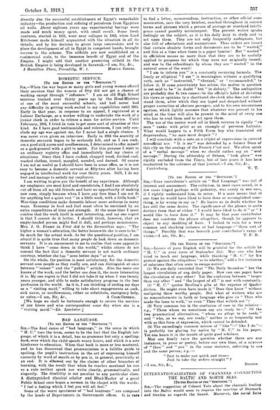DOMESTIC SERVICE.
[To THR EDITOR OF TIER " Spacrkron."1 SIR,—When the war began so many girls and young women offered their services that the woman of fifty did not get a chance of working except through "influence." I am an old High School mistress trained over thirty years ago by the Head-Mistress of one of the most successful schools, and had never had any difficulty in getting work suited to my capabilities until 1915. Early in that year, in response to an appeal, I registered at a Labour Exchange, as a worker willing to undertake the work of a junior clerk in order to release a man for active service. Until February, 1916, I tried in vain to get some sort of situation of this kind. As I have good testimonials and references, I can only con- clude my age was against me, for I never had a single chance. I was never even given an interview. Early in 1916 the scarcity of domestic servants began to be seriously felt, and 88 I can cook, am a good sick nurse and needlewoman, I determined to offer myself as a ok-general with a girl to assist. For this purpose I wont to an ordinary registry office and immediately had my choice of situations. Since then I have cooked, chopped wood, fetched coal, washed clothes, ironed, mangled, mended, and darned. Of course
I am not so useful as I should have been in some office, as it is not easy to become a domestic servant at fifty-two after having been engaged in intellectual work for over thirty years. Still, I do my best and manage to satisfy my employers.
I am writing to give you the benefit of my experience. Although my employers are most kind and considerate, I find I am absolutely cut off from all my old friends and have no opportunity of making new ones, simply because when I have any free time I am not fit for anything but a quiet rest "in a little nook, with a little book." War-time conditions make domestic labour more arduous in many ways. Economy in food and fuel must often be exercised by an extra expenditure of time and strength. At the same time I must confess that the work itself is most interesting, and my one regret is that I cannot do it better. I should think, however, that an empty-headed person might find it dull, and perhaps monotonous. Mrs. J. G. Frazer in First Aid to the Servantless says: "The higher a woman's education, the better housewife she is sure to be." So much for the actual work. As for the question of position, I am afraid it is quite true that many people do look down on domestic servants. It is an amusement to me to realize that some appear.to think I have "come down in the world," whilst others do not conceal the fact that a domestic servant is not worth ordinary courtesy, whether she has "seen better days" or not.
On the whole, the position is most satisfactory, for the domestic servant sees people as they really are, and can distinguish at once between " veneer " and the "pukka" article. Also the more one knows of the work, and the better one does it, the more interesting it is. My one regret is that I did not take it up when I was twenty years younger, and able to make satisfactory progress in the best profession in the world. As it is, I am thinking of ending my days as a "visiting maid," willing to take short engagements as cook, sick nurse, or needlewoman, either as substitute, emergency help,
or extra.—! am, Sir, Sic., A COOK-GENERAL. [We hope we shall be fortunate enough to secure the services of our brave and wise correspondent some day when she is a "visiting maid."—ED. Spectator.]


































 Previous page
Previous page